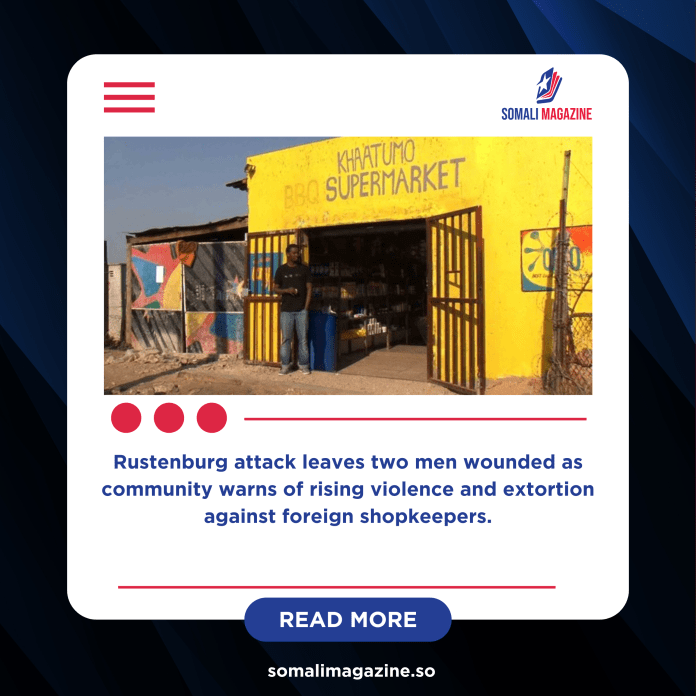Facebook Twitter (X) Instagram Somali Magazine - People's Magazine
Two Somali nationals were seriously injured late Tuesday when armed robbers attacked a shop in Zinniaville, a neighborhood in Rustenburg. According to community leaders, one of the victims was shot several times and is in critical condition. Both men were rushed to JST Hospital for emergency treatment. Police confirmed they have opened a case and begun investigations, but no arrests have been made.
The attack highlights the ongoing danger faced by Somali shopkeepers in South Africa, where small, foreign-owned businesses have long been targets of violent robberies. Somali traders, often running spaza shops in working-class neighborhoods and townships, continue to live under the threat of daily assaults despite repeated appeals for stronger police protection.
Mustafa Shirwa, chairman of the Somali community in South Africa’s North West Province, condemned the latest violence and urged authorities to do more. “These shops are not just businesses for us; they are essential to the communities we serve. But every day, our people fear for their lives,” he said.
This incident is not isolated. In recent years, Somali traders across the country have faced deadly attacks. Dozens have been killed, while many others have been injured during robberies or extortion-related violence. Just last month, two young Somali shopkeepers were gunned down in Cape Town’s Wallacedene neighborhood. Police suspect the killings were linked to gangs demanding protection money.
Extortion is a major problem in many South African townships. Criminal groups often force Somali shopkeepers to pay “protection fees” to continue operating. Those who refuse are threatened, assaulted, or even killed. In June, Somali traders in Khayelitsha shut down their shops in protest, calling for safety guarantees. But community members say these shutdowns only bring temporary relief, as gangs soon return with new demands.
Rights groups have long warned that Somali, Ethiopian, and Pakistani traders are especially vulnerable. Many run small, family-owned businesses in areas where crime is high and police presence is limited. Their stores often provide affordable groceries and household goods to residents who have few other options, since larger retailers rarely operate in these neighborhoods.
South Africa struggles with one of the highest rates of violent crime in the world, and small business owners in informal settlements are among the most exposed. Armed robberies, shootings, and extortion have become everyday threats, leaving traders in a constant state of fear. For Somali shopkeepers, this danger is made worse by xenophobic tensions, which have fueled attacks against foreign-owned businesses for more than a decade.
Despite these risks, Somali entrepreneurs remain a vital part of South Africa’s township economies. Their shops supply basic goods at lower prices than many competitors, making them crucial lifelines for low-income families. Local residents often rely heavily on these outlets for daily needs, even as traders themselves face life-threatening conditions.
Community leaders continue to press the government and police for urgent action. They are calling for stronger patrols, quicker response times, and tougher measures against extortion gangs. Without these protections, many fear that Somali traders will continue to suffer loss of life and livelihood.
For now, the two victims of the Rustenburg shooting remain in hospital, one fighting for his life. Their ordeal serves as another painful reminder of the risks faced by foreign shopkeepers in South Africa, where running a small business has become an act of courage — and survival.

